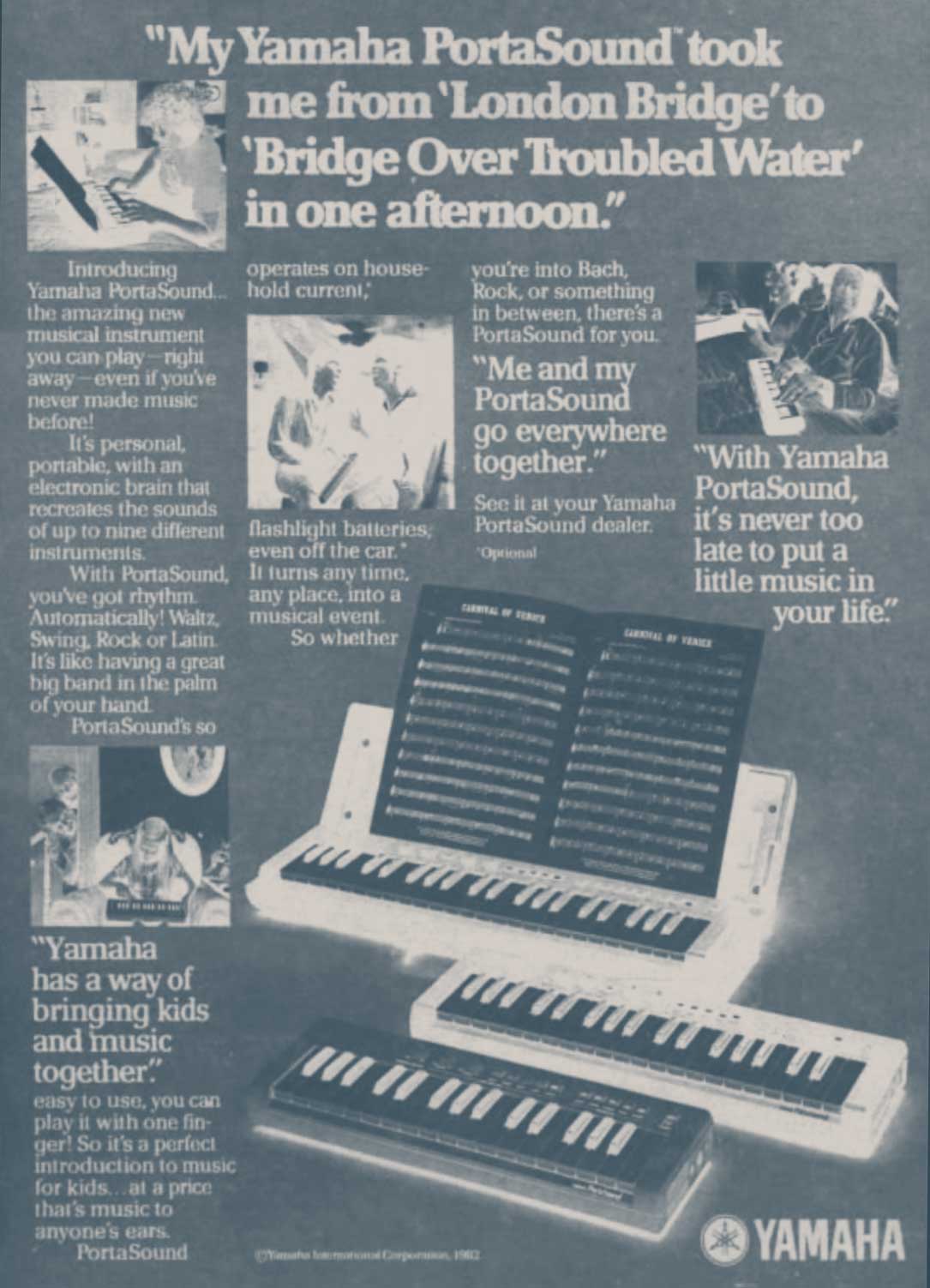Andy Webster
“The obsolete might be brought back as a nostalgic moment but also reanimated coldly and synthetically”
Enrico Monacelli
The three pieces here each begin by repurposing existing materials with the desire to provide temporary escape routes that might lead towards different imaginaries; more enjoyable, inauthentic, dissonant and synthetic in form.
![Portasound advert from 1982]()
"Das Obsolete kann als nostalgischer Moment zurückgebracht, aber auch kalt und synthetisch wiederbelebt werden" Enrico Monacelli
Die drei Stücke hier beginnen jeweils mit der Wiederverwendung vorhandener Materialien mit dem Wunsch, temporäre Fluchtwege zu schaffen, die zu verschiedenen Imaginationen führen könnten; zu angenehmeren, unauthentischen, dissonanten und synthetischen Formen.
“The obsolete might be brought back as a nostalgic moment but also reanimated coldly and synthetically”
Enrico Monacelli
The three pieces here each begin by repurposing existing materials with the desire to provide temporary escape routes that might lead towards different imaginaries; more enjoyable, inauthentic, dissonant and synthetic in form.

"Das Obsolete kann als nostalgischer Moment zurückgebracht, aber auch kalt und synthetisch wiederbelebt werden" Enrico Monacelli
Die drei Stücke hier beginnen jeweils mit der Wiederverwendung vorhandener Materialien mit dem Wunsch, temporäre Fluchtwege zu schaffen, die zu verschiedenen Imaginationen führen könnten; zu angenehmeren, unauthentischen, dissonanten und synthetischen Formen.
From PSS-30 (1982) to PSS-7 (1997): A Chronological Evolution of the Demos (24.10)
An advert from 1982 describes Yamaha’s Portasound Keyboard series as being like travel machines, the strapline saying “my Portasound took me from ‘London Bridge’ to Bridge Over Troubled Water’ in one afternoon.
The PSS series was released not for the specialist pro-synth enthusiast market but for the ordinary home player – a time travel machine for the common people. A constant feature found on all the keyboards throughout the series was the demo track – in essence a demo for the demos.
From the PSS-30 (1982) to the PSS-7 (1997) charts a chronological evolution of the demos.
From I will be king to just for one day (After La Monte Young’s Trio for Strings) (17.12)
3 sounds from Robert Fripp’s solo guitar parts for David Bowie’s Heroes are repurposed; timestretched, pitch changed, and layered to synthetically (somewhat crudely) replicate the structure of La Monte Youngs, Trio for Strings.
Somewhere Over and Over and Over the Rainbow (07.59)
An unlimited number of recordings of tribute bands playing the intro to Rainbow’s ‘Kill the King’ played back to back for an unspecified duration.
From PSS-30 (1982) to PSS-7 (1997): A Chronological Evolution of the Demos (24.10)
Eine Werbung aus dem Jahr 1982 beschreibt Yamahas Portasound-Keyboard-Serie als eine Art Reisemaschine: "Mein Portasound brachte mich an einem Nachmittag von 'London Bridge' zu 'Bridge Over Troubled Water'.
Die PSS-Serie wurde nicht für den spezialisierten Pro-Synth-Enthusiasten-Markt, sondern für den gewöhnlichen Heimspieler herausgebracht - eine Zeitreise-Maschine für das gemeine Volk. Ein konstantes Merkmal, das bei allen Keyboards der Serie zu finden war, war der Demo-Track - im Grunde ein Demo für die Demos.
Vom PSS-30 (1982) bis zum PSS-7 (1997) präsentiert eine chronologische Entwicklung der Audio-Demos.
From I will be king to just for one day (After La Monte Young’s Trio for Strings) (17.12)
3 Klänge von Robert Fripps Solo-Gitarrenparts für David Bowies Heroes werden wiederverwendet; zeitlich gedehnt, in der Tonhöhe verändert und geschichtet, um die Struktur von La Monte Youngs Trio for Strings synthetisch (etwas grob) zu replizieren.
Somewhere Over and Over and Over the Rainbow (07.59)
Eine unbegrenzte Anzahl von Aufnahmen von Tribute-Bands, die das Intro von Rainbows "Kill the King" für eine unbestimmte Dauer Rücken an Rücken spielen.
![]()
www.contingent.info
https://andyw.bandcamp.com/
An advert from 1982 describes Yamaha’s Portasound Keyboard series as being like travel machines, the strapline saying “my Portasound took me from ‘London Bridge’ to Bridge Over Troubled Water’ in one afternoon.
The PSS series was released not for the specialist pro-synth enthusiast market but for the ordinary home player – a time travel machine for the common people. A constant feature found on all the keyboards throughout the series was the demo track – in essence a demo for the demos.
From the PSS-30 (1982) to the PSS-7 (1997) charts a chronological evolution of the demos.
From I will be king to just for one day (After La Monte Young’s Trio for Strings) (17.12)
3 sounds from Robert Fripp’s solo guitar parts for David Bowie’s Heroes are repurposed; timestretched, pitch changed, and layered to synthetically (somewhat crudely) replicate the structure of La Monte Youngs, Trio for Strings.
Somewhere Over and Over and Over the Rainbow (07.59)
An unlimited number of recordings of tribute bands playing the intro to Rainbow’s ‘Kill the King’ played back to back for an unspecified duration.
From PSS-30 (1982) to PSS-7 (1997): A Chronological Evolution of the Demos (24.10)
Eine Werbung aus dem Jahr 1982 beschreibt Yamahas Portasound-Keyboard-Serie als eine Art Reisemaschine: "Mein Portasound brachte mich an einem Nachmittag von 'London Bridge' zu 'Bridge Over Troubled Water'.
Die PSS-Serie wurde nicht für den spezialisierten Pro-Synth-Enthusiasten-Markt, sondern für den gewöhnlichen Heimspieler herausgebracht - eine Zeitreise-Maschine für das gemeine Volk. Ein konstantes Merkmal, das bei allen Keyboards der Serie zu finden war, war der Demo-Track - im Grunde ein Demo für die Demos.
Vom PSS-30 (1982) bis zum PSS-7 (1997) präsentiert eine chronologische Entwicklung der Audio-Demos.
From I will be king to just for one day (After La Monte Young’s Trio for Strings) (17.12)
3 Klänge von Robert Fripps Solo-Gitarrenparts für David Bowies Heroes werden wiederverwendet; zeitlich gedehnt, in der Tonhöhe verändert und geschichtet, um die Struktur von La Monte Youngs Trio for Strings synthetisch (etwas grob) zu replizieren.
Somewhere Over and Over and Over the Rainbow (07.59)
Eine unbegrenzte Anzahl von Aufnahmen von Tribute-Bands, die das Intro von Rainbows "Kill the King" für eine unbestimmte Dauer Rücken an Rücken spielen.

www.contingent.info
https://andyw.bandcamp.com/